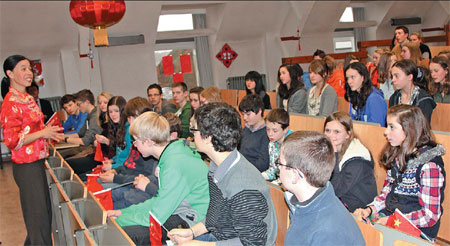Europeans adapt to a new word order
Updated: 2013-03-25 08:00
By Tuo Yannan (China Daily)
|
||||||||
|
Clockwise from top: Chen Hsiu-yin teaching Chinese at the French-speaking Institut de la Providence de Champion. The 165-year-old school added Chinese classes in 2011. Chinese class staff and students from Koninklijk Atheneum Sint-Pieters-Woluwe middle school. Harchies Saint Franois primary school students displaying their calligraphy. Members of the Eurochine Chinese School in Brussels celebrating Chinese Spring Festival. Students from Harchies Saint Franois primary school in Brussels learning how to use chopsticks. Liu Ge / for China Daily |
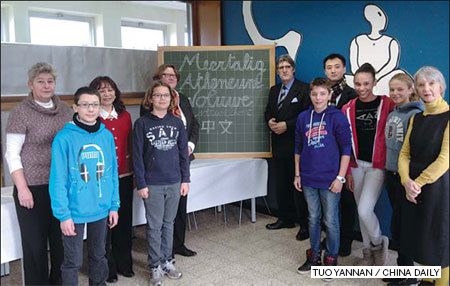
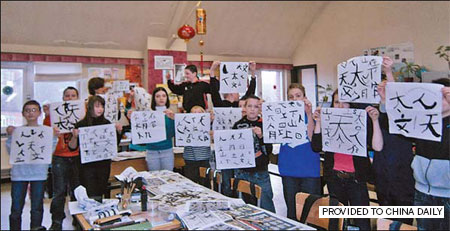
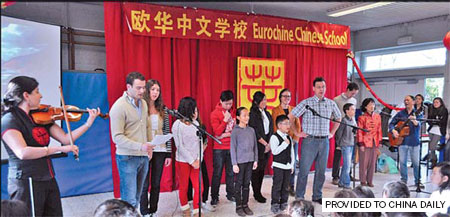
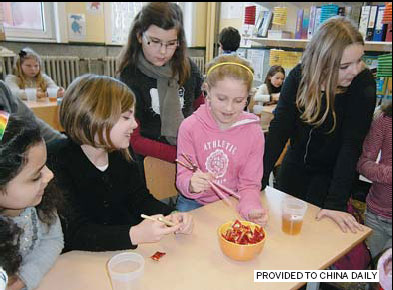
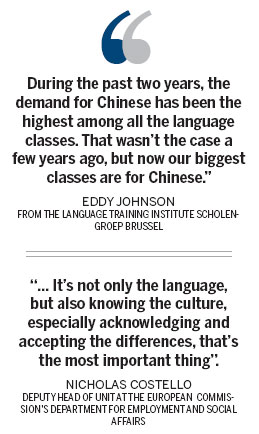
Increasing demand for Chinese classes stems from surge in Sino-EU trade relationship, reports Tuo Yannan in Brussels.
Instead of entering a university after his graduation from high school next year, Kieran-Jack Costello will travel to China alone and spend a year exploring the world's most-populous country.
From the perspective of a Chinese family, his decision would be considered wild or crazy, but instead, the 17-year-old who lives in Belgium has the full support of family and friends. Some admit they envy him.
"My school hasn't introduced Chinese classes yet, but we have French, German, Dutch and Japanese," said Kieran-Jack, who spends three hours a week learning Chinese in his spare time to prepare for his adventure.
"I think going to China for a year is a very good opportunity before the university. I'm excited about putting my Chinese into practice!"
Kieran-Jack's strongest supporter has been his father, Nicholas Costello, deputy head of unit at the European Commission's department for employment and social affairs. That's hardly surprising, because Costello senior was posted to Beijing several years ago and speaks Mandarin well. He believes his son's generation will benefit from the ever-closer ties between Europe and China.
"China has become much more connected with the world economically and is now the EU's second-biggest trading partner, so speaking English and Chinese in the 21st century will be a very big advantage," he said. "It's not only the language, but also knowing the culture, especially acknowledging and accepting the differences, that's the most important thing".
Costello's family isn't unusual by any stretch of the imagination, even though Kieran-Jack's background - Brussles-based, with a father from the UK and mother from Africa - is almost a template of diversity.
The number of people enthusiastically learning all they can about China is increasing dramatically in Europe, especially in light of the country's increasing influence on the global economy.
Europe has often repeated its commitment to open trade relations with China, most notably in the increasing efforts across the EU to improve communications with the country. One of the most striking changes of recent years is the number of officials and employees that have started learning Chinese.
"The main purpose of providing Chinese classes for EU employees and officers is that we want to promote the relationship between China and the European Union, commercially and culturally," said Anna Varna of the European Commission's human resources and security department.
The increasing demand for Chinese classes is associated with the surge in Sino-EU trade relationship, said Varna. China is the EU's second-largest trading partner, after the United States, and the EU is China's biggest trading partner.
In 2012, EU investment in China reached more than $6 billion, while $3.4 billion went from China into the EU, according to official data.
Rising demand
"During the past two years, the demand for Chinese has been the highest among all the language classes. That wasn't the case a few years ago, but now our biggest classes are for Chinese," said Eddy Johnson from the language training institute Scholengroep Brussel.
For many years, French, Russian and Spanish were the most popular courses among European Union and Commission staff, but as Johnson noted, Chinese and Arabic are now the languages of choice.
The Chinese class has about 60 students at different levels of proficiency, and the reasons for joining vary. One of the students, Demur Gaspard, who works for the European Commission, is learning Chinese to help him at work. "I deal mainly with Chinese affairs, so I'm learning the language for professional reasons," he said.
Apart from work-related reasons, many officials are learning Chinese for their own enjoyment. Tami Julien, director-general of development and cooperation at the European Commission, said his work mainly involves African issues, so for him learning Chinese is more about personal enjoyment.
One European Commission translator, who wanted to be known simply as Victor, has worked for international organizations for 25 years. He speaks fluent Spanish, Italian, English and French and is now learning Chinese: "I think Chinese is a very important language. I'm interested in learning about the country's culture and language. Also it's my obligation to stay up to date."
Many EU officials have hired Chinese-speaking assistants to better connect with the country. Pawel Bienkowski, a 26-year-old assistant to Wojciech Olejniczak, a Polish member of the European Parliament, enjoys greeting Chinese reporters in fluent Mandarin, while Victor Bostinaru, a member of the European Parliament and vice-chairman of the delegation for relations with China, has hired a Chinese assistant ahead of a trip to the country next month.
However, EU employees are not the only ones learning Chinese, and the implementation of language classes is one of the hottest topics among school boards and parents in many European schools.
"Three years ago, only three schools in the French-speaking areas of Belgium taught Chinese. Now the number has climbed to more than 30. In the Dutch-speaking areas, it used to be four, but now 19 universities and schools have set up Chinese language courses," explained Wang Luxin, counsellor to the education department of the Chinese embassy in Belgium.
Olaf Mertens, director of the 165-year-old French-speaking Institut de la Providence de Champion, added Chinese classes to the range of options at his middle school in 2011 in the hope that they will provide the children with a wider view of the world.
The school has 50 Chinese-language students, aged 12 to 15, and while the classes are not compulsory, many students have expressed a desire to learn the language and the school has received strong support from parents, he said.
Chinese teacher Chen Hsiu-yin, began her career in 2000. She visits the school once a week to teach a two-hour class, "I have received very positive feedback from the students, and they are all studying extremely hard," she said.
Another teacher in the city, Xie Xiaolin, taught English in East China's Zhejiang province before moving to Belgium in 1994. She began teaching Chinese in 2006.
"In recent years I have been much busier than before; every week I work four days, teaching four classes. From my own experience, I can see that the demand for Chinese has increased hugely," said Xie.
Androulla Vassiliou, European commissioner for education, culture, multilingualism, sport, media and youth, said she's proud of the commission's achievements in 2012 in terms of EU-China relations and confidently expects 2013 to be as conducive for fostering deeper, mutual understanding between the EU and the Chinese people.
Growing trend
The Woluwe European School in Brussels is a good example of the growing trend, she said.
It is part of Schola Europaea, or European Schools, an umbrella organization consisting of establishments that offer primary and secondary education and are located across seven countries.
The establishments, controlled jointly by the governments of EU member states, have more than 24,000 pupils, and the European Commission is a member of the board of governors.
The school has forged close links with its counterparts in China over the years, from introducing Chinese study in secondary schools to establishing a student exchange program with the Experimental School in Shanghai.
"I know that this school has very exciting plans to introduce courses in Mandarin and calligraphy, all taught by Chinese teachers," Vassiliou added.
During Chinese New Year, the Mission of the People's Republic of China to the European Union held a celebration at the European School Brussels IV, a plush establishment whose buildings were part of a palace occupied by the Belgian royal family before being donated to the EU last year.
Brussels IV, also a part of Schola Europaea, is one of the group's four schools in Brussels. The majority of students are the children of officials and other EU employees, according to Kari Kivinen, secretary-general of Schola Europaea.
Kivinen said the celebrations for the Chinese New Year have been very influential. Demand was so high that all 800 places were filled in just two days.
"Chinese has been taught in our schools for several years already, because EU policy is to open up further to China, so parents are very keen for their children to learn the language," added Kiniven.
During the Chinese Spring Festival, hundreds of elementary students - many of whom were dressed in traditional Chinese clothing such as Tang suits or qipao - and parents watched a performance of Chinese arts before participating in a range of traditional cultural activities, including making dumplings, the tea ceremony, calligraphy, folk music and tai chi.
Seven-year-old primary school student Louisa said she celebrated Chinese New Year along with her classmates. Her father was extremely keen to accompany his daughter and participate in the celebrations as a way of further encouraging Lousia's interest in the subject.
For Androulla Vassiliou, the increasing demand for Chinese is about looking forward to greater integration, deeper ties and a new direction for Europe.
"The Europe of tomorrow will not be inward-looking, focused on its own habits, languages and cultures. It will be a space increasingly open to exchanges with other peoples, a crossroads of multiple visions and values. I believe I can speak for our Chinese friends when I say that they share our vision of closer future relations based on mutual knowledge, respect and understanding."
Contact the writer attuoyannan@chinadaily.com.cn
(China Daily 03/25/2013 page6)

 In Photos: 7.0-magnitude quake hits Sichuan
In Photos: 7.0-magnitude quake hits Sichuan
 Li Na on Time cover, makes influential 100 list
Li Na on Time cover, makes influential 100 list
 FBI releases photos of 2 Boston bombings suspects
FBI releases photos of 2 Boston bombings suspects
 World's wackiest hairstyles
World's wackiest hairstyles
 Sandstorms strike Northwest China
Sandstorms strike Northwest China
 Never-seen photos of Madonna on display
Never-seen photos of Madonna on display
 H7N9 outbreak linked to waterfowl migration
H7N9 outbreak linked to waterfowl migration
 Dozens feared dead in Texas plant blast
Dozens feared dead in Texas plant blast
Most Viewed
Editor's Picks

|

|

|

|

|

|
Today's Top News
Live report: 7.0-magnitude quake hits Sichuan, heavy casualties feared
Boston suspect cornered on boat
Cross-talk artist helps to spread the word
'Green' awareness levels drop in Beijing
Palace Museum spruces up
First couple on Time's list of most influential
H7N9 flu transmission studied
Trading channels 'need to broaden'
US Weekly

|

|
